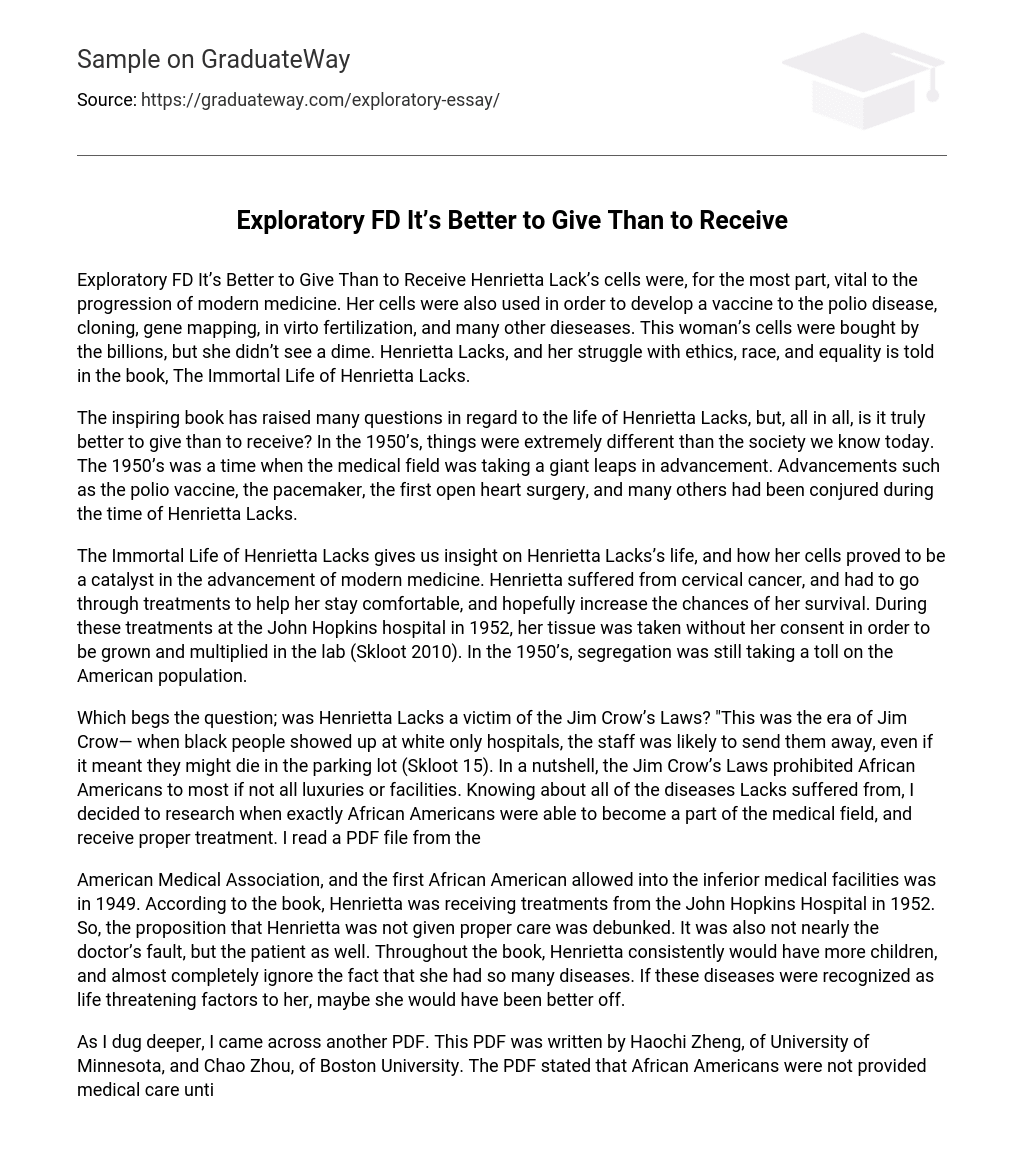Henrietta Lack’s cells were, for the most part, vital to the progression of modern medicine. Her cells were also used in order to develop a vaccine to the polio disease, cloning, gene mapping, in virto fertilization, and many other dieseases. This woman’s cells were bought by the billions, but she didn’t see a dime. Henrietta Lacks, and her struggle with ethics, race, and equality is told in the book, The Immortal Life of Henrietta Lacks.
The inspiring book has raised many questions in regard to the life of Henrietta Lacks, but, all in all, is it truly better to give than to receive? In the 1950’s, things were extremely different than the society we know today. The 1950’s was a time when the medical field was taking a giant leaps in advancement. Advancements such as the polio vaccine, the pacemaker, the first open heart surgery, and many others had been conjured during the time of Henrietta Lacks.
The Immortal Life of Henrietta Lacks gives us insight on Henrietta Lacks’s life, and how her cells proved to be a catalyst in the advancement of modern medicine. Henrietta suffered from cervical cancer, and had to go through treatments to help her stay comfortable, and hopefully increase the chances of her survival. During these treatments at the John Hopkins hospital in 1952, her tissue was taken without her consent in order to be grown and multiplied in the lab (Skloot 2010). In the 1950’s, segregation was still taking a toll on the American population.
Which begs the question; was Henrietta Lacks a victim of the Jim Crow’s Laws? “This was the era of Jim Crow— when black people showed up at white only hospitals, the staff was likely to send them away, even if it meant they might die in the parking lot (Skloot 15). In a nutshell, the Jim Crow’s Laws prohibited African Americans to most if not all luxuries or facilities. Knowing about all of the diseases Lacks suffered from, I decided to research when exactly African Americans were able to become a part of the medical field, and receive proper treatment. I read a PDF file from the American Medical Association, and the first African American allowed into the inferior medical facilities was in 1949.
According to the book, Henrietta was receiving treatments from the John Hopkins Hospital in 1952. So, the proposition that Henrietta was not given proper care was debunked. It was also not nearly the doctor’s fault, but the patient as well. Throughout the book, Henrietta consistently would have more children, and almost completely ignore the fact that she had so many diseases. If these diseases were recognized as life threatening factors to her, maybe she would have been better off.
As I dug deeper, I came across another PDF. This PDF was written by Haochi Zheng, of University of Minnesota, and Chao Zhou, of Boston University. The PDF stated that African Americans were not provided medical care until the mid-1960s when hospitals became racially integrated. So, at the same token, Henrietta could have been a victim of racial segregation. As I read further into the PDF, it also stated that during the 1920s-1950s, it was not abnormal to not get consent from the donor before taking any type of bodily samples.
Which raised the question, If Lacks did give consent, would she have still asked for more recognition? Since it was not abnormal to receive consent before taking any body fluids at the time of Henrietta Lacks, why was she asking for so much recognition? Maybe it had to do with the fact that she was African American in the time of all of the segregation laws. Another thing that came to mind was the huge racial aspect part of the book. Throughout the book, I imagined what it would be like for Henrietta if she was Caucasian instead of African American. If Henrietta was indeed Caucasian, she would most likely still be alive today.





